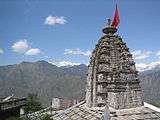Bhimakali Temple


Shri Bhima Kali Temple is a temple at Sarahan in Himachal Pradesh in India, dedicated to the mother goddess Bhimakali, presiding deity of the rulers of former Bushahr (Hindi: बुशहर) State. The temple is situated about 180 km from Shimla and is one of 51 Shakti Peethass. The town Sarahan is known as the gate way of Kinnaur. Down below at a distance of 7 km from Sarahan is the River Satluj. Sarahan is identified with the then Sonitpur mentioned in Puranas.[1]
Legend about Bhimakali
According to a legend, the manifestation of the goddess is reported to the Daksha-Yajna incident when the ear of the Sati fell at this place and became a place of worship as a Pitha - Sthan. Presently in the form of a virgin the icon of this eternal goddess is consecrated at the top storey of the new building. Below that storey the goddess as Parvati, the daughter of Himalaya is enshrined as a divine consort of Lord Siva.
The temple complex has another three temples dedicated to Lord Raghunathji, Narsinghji and Patal Bhairva Ji (Lankra Veer) - the guardian deity.
History
Sarahan was the capital of rulers of former Bushahr State. Bushahr dynasty earlier used to control the state from Kamroo. The capital of state later was shifted to Sonitpur. Later Raja Ram Singh made Rampur as the capital.[1] It is believed that the country of Kinnaur was the Kailash mentioned in Puranas, the abode of Shiva. With its capital at Sonitpur this former princely state was extended up to entire area of Kinnaur where for sometimes Lord Shiva disguised himself as Kirata. Today, the then Sonitpur is known as Sarahan. Banasura, the ardent devotee of Lord Siva, eldest among the one hundred sons of great ablative demon King Bali and the great grandson of Vishnu votary Prahlad, during the Puranic age was the ruler of this princely state.
Gallery
 On one of the doors of the temple
On one of the doors of the temple Bird's eye view of Bhimakali temple during monsoon
Bird's eye view of Bhimakali temple during monsoon Bhimakali Temple in the background
Bhimakali Temple in the background A temple alongside the Bhimakali temple
A temple alongside the Bhimakali temple
References
External links
| Wikimedia Commons has media related to Bhimakali Temple. |